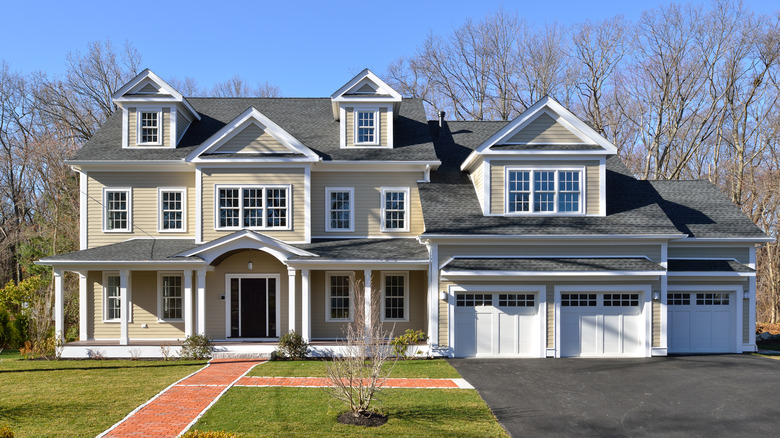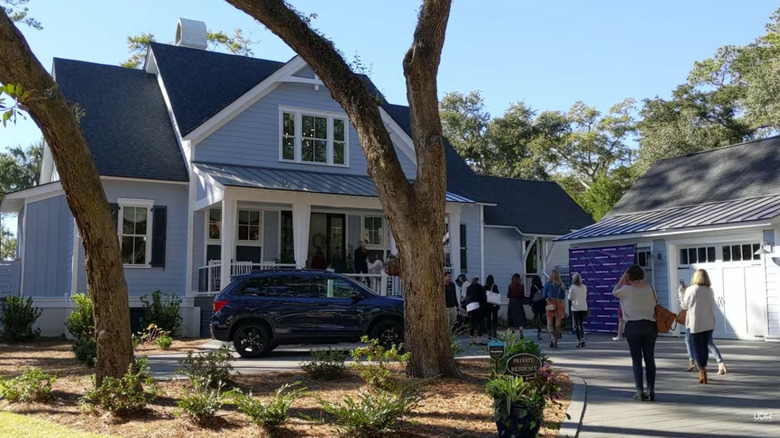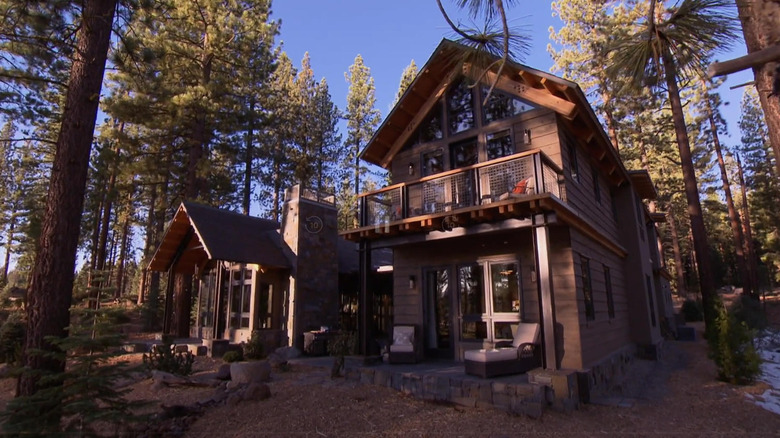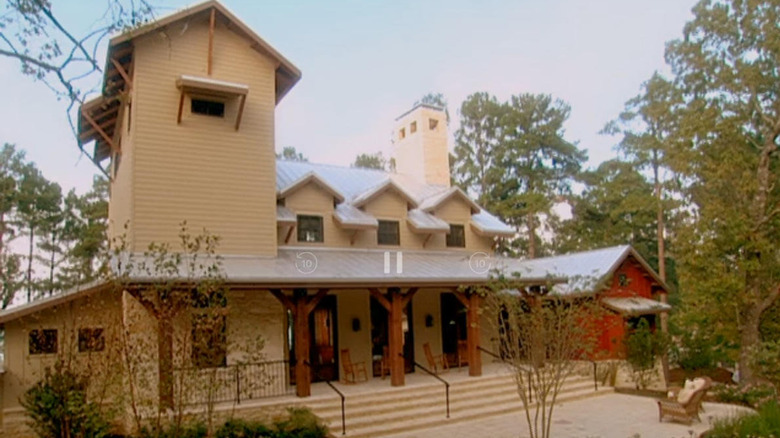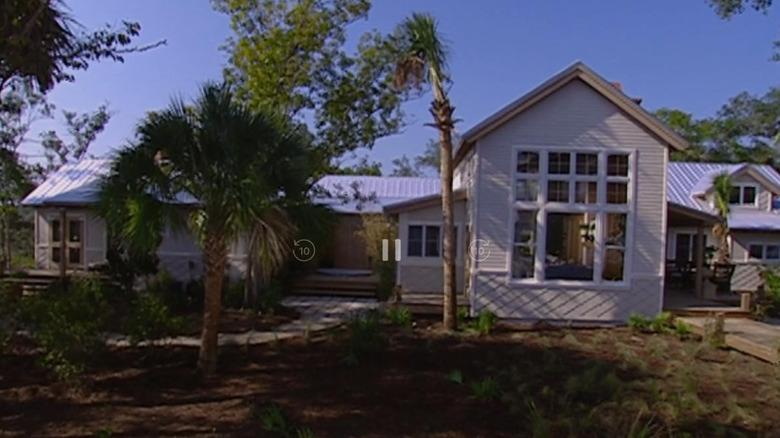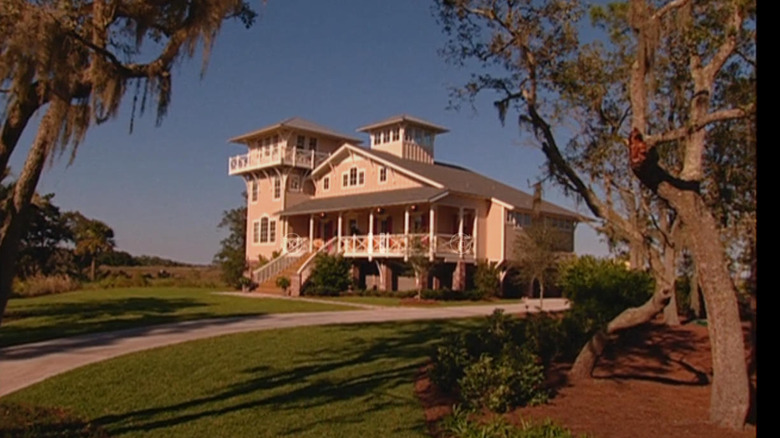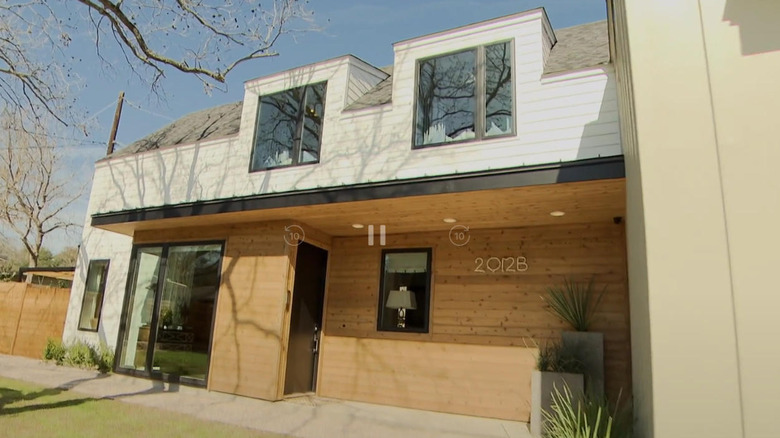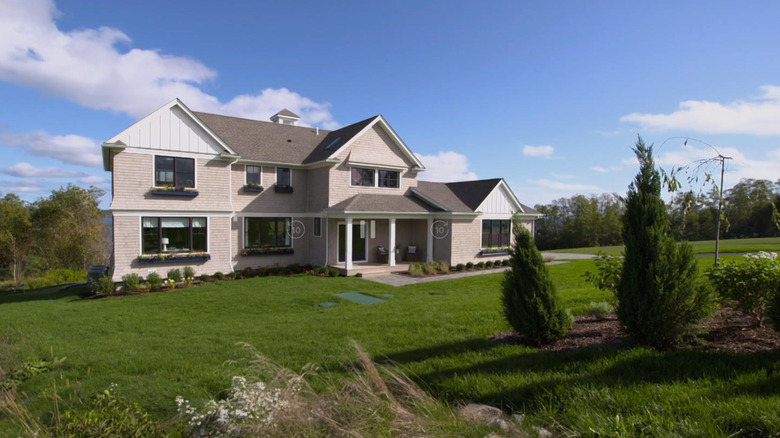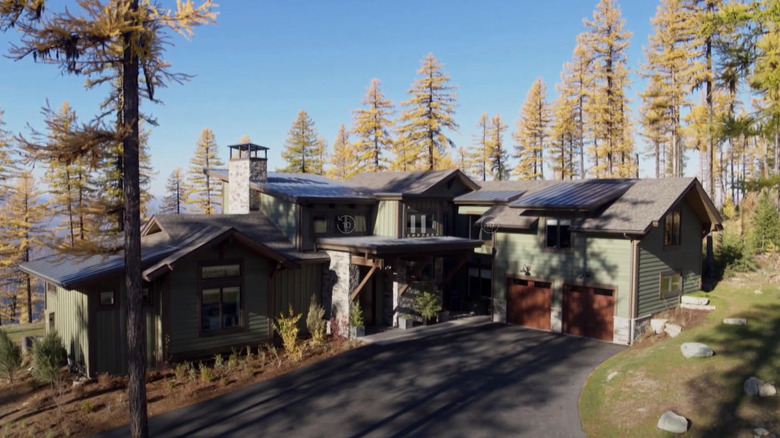HGTV Contestants Who Couldn't Afford Their New Homes
It's no longer a secret (if it ever really was) that most people who win homes from HGTV shows like "Dream Home" can't really afford to see their dream come true, but that certainly doesn't dissuade other dreamers. The 2022 "Dream Home" winner, Karey Wolstenholm, was selected from more than 142 million entries, up from 2.5 million in 1998, the show's first year. And so far Wolstenholm is still living in her dream home, but most aren't.
In fact, it's probably fair to say that no winner of an HGTV Dream Home could easily afford to take the prize, given the immediate tax bill. CNBC estimated the taxes on the 2019 Dream Home at $907,677. The annual property tax bill alone (about $12,60 for the 2019 winner) has proven too daunting for at least one winner. All the strategies for paying such a tax bill — selling a current home, getting a mortgage on the new property, paying the taxes from savings, etc. — probably require a level of affluence that's beyond the average contestant. A few stubbornly try to make it work, but more fold pretty quickly and put their dream home on the market. Most, having faced the facts early on, take the cash option and never spend a single night as the owner of the dream house.
You could argue that this is for the best. The TV show is a fantasy, after all, and maybe living out our wildest dreams isn't the most practical outcome. It's not that we don't deserve the big beach home. It's that we might not be able to transpose the typical middle-class juggling act onto the extravagance of a $2 million home with a world-class view. Fortunately, there's an easy alternative.
Cashing out instead
When Susan O'Gorman won the "Dream Home" contest in 2020, it seemed tailor-made for her family. The house was located on Hilton Head Island, South Carolina, where her family had frequently vacationed, according to The Atlanta Journal-Constitution. But not long after the announcement episode aired, O'Gorman decided to take the cash option outlined in the HGTV sweepstakes rules, never taking possession of the house at all. Some contestants try to keep their homes, some sell them within a few years, but more are taking the cash option instead. According to HGTV's official sweepstakes rules, the 2023 cash option is $750,000, accepted in lieu of the house and its contents. The winner also gets the vehicle and cash prizes, usually a nice car, and $100,000 to 250,000. For the 2023 contest, the total approximate retail value (ARV) of the awards, including the house, is $2,550,092; the ARV of the prizes for the cash option is $925,120.
The cash option isn't just for multi-million-dollar homes, either. HGTV's "Smart Home" and "Urban Oasis" giveaways also have a cash option, and at a glance, it looks like as many as half of the winners end up cashing out in advance. If users can't afford the much cheaper smart homes and Urban Oasis properties, there's no reason to suspect they could afford homes that cost two to three times as much.
So what are all the expenses associated with winning a dream home? The sweepstakes rules' list of stuff HGTV won't be responsible for is instructive. It includes real estate transfer taxes, closing costs, insurance costs, deed recording charges, and any other costs related to purchasing and receiving a home.
Laura Martin's Dream Home in 2014
"The reality is that you may not be able to live or keep the dream home due to taxes," the 2014 "Dream Home" winner told The Newport Daily News, "but you are afforded a different dream of altering your reality and your immediate situation." Laura Martin also took the cash option, but has nothing but positive things to say about the whole experience. Not that she wouldn't have loved to have the home; almost anyone would. It was a rustic-modern mountain home in Lake Tahoe with fantastically high ceilings and quite a view. Designer Linda Woodrum outfitted the house with modern but cozy furniture perfect for the New Mountain-style house (via HGTV). In fact, Martin was very clear that she would have loved to move into the home, and she was equally clear about why she couldn't. "Unfortunately, Uncle Sam was the reasoning," she told the Daily News. "I was completely ready to pack up and move to Tahoe to live in the house but Uncle Sam decides that he wants his tax cut and that was too cost prohibitive to retain the home."
Martin is relentlessly positive because winning the prize — even the cash option prize — made a "different dream" possible. She and her husband used the winnings to pay cash for a new home, and they sold the Yukon Denali that was part of the prize to buy two more practical vehicles for their family.
Don Cruz's Dream Home in 2005
If any "Dream Home" winner were to have a viewpoint less positive than Martin's, it would be Don Cruz, who won in 2005. Cruz's home ended up in foreclosure after he mortgaged it to pay medical bills for his wife and father. But Cruz feels blessed by the prize and the life-giving treatments it enabled. In fact, he told LiveAbout in 2009 that he had no regrets and was, in fact, still submitting entries in hopes of winning another dream home.
When Cruz won the Tyler, Texas, house, as well as $250,000 and a GMC Denali, his family became the only winners in the first decade of the contest to attempt to live in the Dream Home (via CNNMoney). It's not hard to understand why. The castle-like house was made warm and inviting in every rustic detail. Some of the living spaces (the kitchen, for example, and the guest bedroom complete with limestone archway) are grand, while others (like the entertainment room) are downright homey. And Cruz intended to make a home of it.
But after taking a mortgage on the home in 2006 and falling four months behind in his payments, his mortgage company started foreclosure proceedings, and the house was auctioned at the beginning of 2008. But it wasn't the size of the mortgage alone that spoiled Cruz's dream. Surprise medical bills (for his wife's brain surgery and his father's cancer), a business plan that didn't pan out, and unexpectedly high living expenses took their toll. In the end, Cruz insists he's better off for having had the experience, even if all he was left with was the Denali and some souvenirs from the house furnishings.
John Groszkiewicz's Dream Home in 2003
When John Groszkiewicz won a $1 million Dream Home in 2003, he and his family made a go of it. "I'd hate to make a decision to sell the house, then go down there and fall in love with it," he told the Pittsburgh Post-Gazette. "I'm kinda in love with it already." HGTV likened the 2,800-square-foot waterfront house to a "tropical camp compound" featuring indoor/outdoor living spaces and spectacular views. The house's architect, Randy Johnson, was going for something unique. "It's a Dream House in the way it lives," he said. "It's not gold faucets that make a Dream House. It's deeper. It's not a financial dream, it's a spiritual dream" (via HGTV).
But what Groszkiewicz ended up realizing was the financial dream. After a few months of visits to the home, they faced fiscal facts and decided to sell it for $800,000, which enabled them to move 11 miles down to a bigger house. As it would be for many, this was plenty of dream for Groszkiewicz, his wife, and their four children. His wife was able to become a stay-at-home mom, and they paid off all their debt. "Our vision of the dream is that it enables you to do what you want to do," HGTV spokeswoman Emily Yarborough said. Like Cruz, Groszkiewicz still enters the "Dream Home" sweepstakes each year.
After selling the house, the couple was audited twice by the IRS. The second audit resulted in the IRS owing Groszkiewicz 18 cents ... somewhat different from Don Cruz's experience.
Kathi Nakao's Dream Home in 2004
If Don Cruz's 2005 "Dream Home" looked like a motte-and-bailey castle, the 2004 house instantly reminds one of a medieval coastal fort. It is at once odd and perfect. It features both an Italianate cupola and widow's walk, but on separate vertical structures instead of combined, as is the convention. In an NPR interview, poet and critic John Ciardi pointed out that the widow's walk was probably not meant for wives watching for returning sailor husbands, but for putting out chimney fires. But the St. Mary's, Georgia, "Dream Home" does look like it has incorporated a couple of lookout towers. Indeed, one could be forgiven for thinking it looks a bit like an air traffic control or prison guard tower. For all that, the home is lovely and clearly luxurious, which perhaps alerted 2004 winner Kathi Nakao to potentially stormy financial waters.
The retirees enjoyed the property for over a year, but Nakao told The Press Democrat that she knew within the first day that they wouldn't be able to keep the home. Ultimately, she sold it after only 18 months of ownership. But a plan developed that brought some of the glamour and luxury of the dream back to their existing home. With the proceeds from the "Dream Home" sale, the couple intentionally renovated their old house to incorporate design flourishes from the St. Mary's house, including using some of the actual furniture they had won.
"I enjoyed every minute of it," Nakao told The Press Democrat. "It was my lottery, my chance. I would hope everyone in the world would have a chance to feel like I did."
Isabel Villarreal's Smart Home in 2015
Around the time Chip and Joanna Gaines were parlaying the modern farmhouse aesthetic into record-breaking ratings, the 2015 HGTV "Smart Home" — an ultramodern farmhouse — was being outfitted in Austin, Texas, and awarded to Texas school principal and mother of three Isabel Villarreal. "I wish I could keep it, it's the most beautiful house I've seen in all my life," she told the San Antonio Express-News. Unfortunately, it's not just federal and state income taxes that can dissuade a winner from moving into her prized home. Villarreal said that high property taxes were behind her decision to sell the house.
"I love Austin," Villarreal told HGTV. "The location of the home was very special, partly because I am from Texas and I was born not too far from the home." But Villarreal was supremely sensible and ended up saving the proceeds from the sale of the smart home, as well as the $100,000 also awarded by Quicken Loans, for her retirement fund. She did, however, keep the 2015 Mercedes-Benz C-Class.
Jeff Yanes' Dream Home in 2021
It seems likely that Jeff Yanes likes Austin even more than Isabel Villarreal, as he opted to stay in Austin with his family and his old home ... and with $1 million in cash winnings and a motorhome. Had Yanes kept his 2021 $2.75 million Cape Cod-style house on Rhode Island's Sakonnet River, he would have been able to skip the $8,745 monthly mortgage payment on the $2.39 million property, but he would still have had to cope with the $1,896 per month property tax bill, as well as the income taxes on all his winnings. Yanes, who is a baked goods delivery contractor, made the decision without ever walking through the Dream Home, according to East Bay Newspapers.
When the home's interior designer, Brian Patrick Flynn, asked Yanes what he liked best about the house, Yanes replied, "The rooftop deck overlooking the river. (It's a great place to) have a cold beverage or a cup of coffee" (via the Newport Daily News). But somewhere in the back of his mind, Yanes must have understood there were more sensible places to have a beer. And that apparently included the Kyle neighborhood of Austin where he lived, an area that Austonia recently called "up and coming" with "skyrocketing" home values.
Beverly Fulkerson's Dream Home in 2019
Just as Jeff Yanes never explicitly said finances were the reason for eschewing his Rhode Island Dream Home, we don't actually know if Indiana grandmother Beverly Fulkerson decided to take the cash option. But at one point, the house was available to rent for $1,200 per night on Rent By Owner, the second most expensive rental we found in the area, and about twice as much as comparable properties in the area.
Fulkerson opted out of additional press coverage about her 2019 win, but we do have some interesting numbers that might shed some light on her decision-making process. CNBC talked to some tax experts at the time, who estimated the taxes Fulkerson would owe on the $2.3 million property. The number that most stands out is that the year one tax burden (federal income tax, Indiana income tax, and Montana property taxes) would have totaled about 40% of the prize's estimated value. Keep in mind, this $907,677 is just the tax burden for the first year of ownership; the $12,600 in property taxes would be an annual expense, and none of these numbers include maintenance and upkeep, which can be extraordinary on luxury homes.
Winners like Jeff Yanes who opt out of a Dream Home aren't dodging $9,000/month mortgage payments (the median U.S. monthly mortgage payment is $1,100, per Rocket Mortgage). They're dodging $900,000 tax bills. In the end, a Dream Home can be exactly the opposite.
